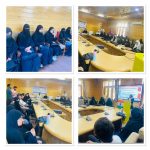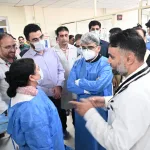Pulwama, Apr 30: Around 4,000 tribal and low-income farmers from various districts of the Kashmir Valley are set to benefit from an outreach initiative by Sher-e-Kashmir University of Agricultural Sciences and Technology of Kashmir (SKUAST-K), under the Tribal Sub Plan.
Officials informed Rising Kashmir that so far, 2,100 farmers across seven districts have already been reached under the program.
Dr. Javid Ahmad Mughloo, Principal Investigator of the project and SKUAST-K Professor, said the initiative has covered Pulwama, Shopian, Anantnag, Kulgam, Srinagar, Ganderbal, and Bandipora districts.
“We are now preparing to reach out to tribal and low-income farmers in North Kashmir,” Dr. Javid said.
He commended SKUAST-K Vice Chancellor Dr. Nazir Ahmad Gania and Director Extension Dr. Raihana Habib Kanth for launching this ICAR-sponsored project under the Tribal Sub Plan across the valley.
Dr. Raihana Habib Kanth told Rising Kashmir that the Indian Council of Agricultural Research (ICAR) has sanctioned the project to promote the socio-economic upliftment of tribal farmers and enhance their agricultural skills.
“The project proposal was submitted by Dr. Javid Ahmad Mughloo, who also heads Krishi Vigyan Kendra (KVK) Malangpora, under a competitive grant scheme,” she said, adding that the project was implemented in the last quarter of the previous year upon approval.
She said that in the first year, approximately 300 tribal farmers from each district will be covered under the initiative.
“One component of the project also focuses on the personality development of tribal students,” Dr. Raihana added.
She said that through a seven-day training program, tribal students are being trained in soft skills, communication, time management, and stress management. She added that the project also aims to empower school dropouts by upgrading their skills to become entrepreneurs and start agri-based start-ups.
As part of the initiative, high-quality seeds of potato and maize (for fodder) have been distributed among tribal farmers. Moreover, paddy seeds were provided under the National Seed Project (NSP).
Farmers were also given demonstrations on best practices for cultivating these Kharif crops.
Dr. Javid further informed that along with seeds, farming tool kits, organic fertilizers, materials for erecting temporary shelters during migration, and hunter boots to protect against snake and insect bites have also been distributed among the tribal communities.








